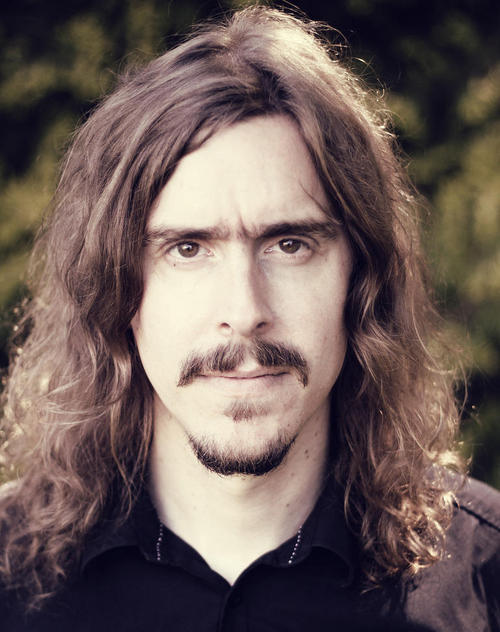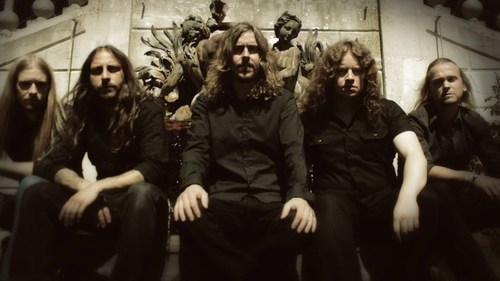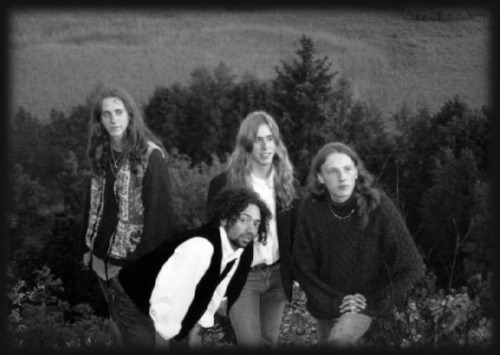
For nearly twenty-five years, Opeth have remained an integral force within heavy metal. From their debut with 1995’s Orchid to this year’s Pale Communion, Opeth have cemented themselves as one of modern metal’s most remarkable bands. What’s most intriguing about Opeth, however, is that while their place within heavy metal’s epicenter is certain, their creative perspective has continually found them wandering unabashedly into a sound that, regardless of its detractors, is wholly their own. At the forefront of Opeth’s success and influence is Mikael Åkerfeldt, whose work with such other heavy metal heavyweights as Bloodbath and Katatonia has shown a diversity both in compositional and vocal stylization that is nearly unparalleled. For Åkerfeldt, what compels him now is what’s compelled him since the beginning: an absolute love for music. The singer/guitarist spoke with SfB recently about Pale Communion as well as what he attributes Opeth’s longevity to, and more in this special feature.
Opeth have always readily displayed progressive characteristics, and it seems like each album has been a fuller realization or perhaps a gradual honing in on that up to Pale Communion. Is that something that’s been a conscious direction for the band, or has it been more of a gradual manifestation of something more instinctive for the band?
Well, if you break down our career and the discography that we have, I can certainly hear progression happening between the records or how a string of records sort of belong together, but it’s just something that happened without us thinking too much. I’ve definitely taken an influence from whatever I’m listening to at the time or some bands are even like DNA like “I feel the need to listen to Judas Priest’s Sad Wings of Destiny today. Wow! What a great record! Now I’m gonna write a song.” The progression to me, even if I wanted it to be progressive, it’s something that I don’t think too much about. It just kind of happens in a way. It might be a simple question, but it’s fucking difficult to answer.
Maybe I should have started out with something a little more grounded? [Laughs]
[Laughs] Yeah, like maybe “What’s the weather like over there?”

It’s just something that’s obviously informed so much of your writing, so it’s not surprising to see Opeth’s music gradually lend itself to that dynamic more and more. When you think about what influences us on a level that’s either consciously or subconsciously influencing what we create it’s fascinating to see how that permeates the creation. Was prog rock something that was a first love for you, or was it something you discovered later in life?
My family wasn’t overly musical and certainly not into rock music, with the exception of a Beatles record which happened to obviously be one of the greatest records and one of their latest and more progressive records, Abbey Road, but prog for me was something I discovered on my own by coincidence, basically. I never made the switch from vinyl to CD fully. Instead, when CDs were coming out, I was going through the vinyl section of the record store and just picking up vinyl for next to nothing. That was my preferred format and still is to this day. In those days when CDs were coming out, people were selling off their vinyl collections, and they were being resold to guys like me to next for nothing.
I was a big Black Sabbath fan, and I was literally looking at pictures of Black Sabbath, and I was collecting clippings, and I had the records and posters and whatever you could buy. If it was Black Sabbath, I collected it, and I thought that they looked cool. I thought Sabbath looked cool. Zeppelin and Black Sabbath, they looked cool, and that’s how I wanted to look at the time. I bought my flares, and I tried to look like a hippie basically. So I was going to those vinyl shops and looking for bands whose members looked a bit like that, to be honest. I found a Yes record, and I was like “Yeah, the cover looks kinda like Sabbath. They’ve got long hair. They’ve got cool trousers,” so I picked it up for like two dollars or something like that, and it was Time and a Word or something, one of those early records, and I was like “Fuck. I love that shit. That’s cool.”
That album came out in 1969 or 1970 or something like that, and then it was “What’s this band that’s got a screaming face on the cover?” That was from 1969, and I’d never heard of it. It’s called King Crimson. It was two dollars, so I was like “OK, I’ll buy that one, too.” And then on it went. I just picked up the records, and I learned from buying the good records. I didn’t have to look at the clothes anymore. [Laughs] I could look at the sleeve, and if it was like an artistic, weird looking sleeve, and it was recorded in 1971, there was a good chance it was gonna be a cool record. I picked everything up and then again, next to nothing. Then I stumbled on Genesis, Camel, Van der Graaf Generator, and all those bands basically, and I was sold. That was my new stuff, and then obviously along came Dream Theater which was a contemporary band, a metal band even, that was influenced by these bands I was picking up, and so I became a big Dream Theater fan at the same time. And that was it.

I have to ask if Rush happened to be one of those bands.
Yeah, but Rush I always considered a hard rock band. I never saw them as prog. The first record I got from them was Moving Pictures, which had “YYZ” on it and obviously some other poppier songs, but “YYZ” was the song for me because it had those strange time signatures, and they also sounded a bit evil. They had these songs with chords that were reminiscent of the Black Sabbath chords. They had evil chords going on. I’d also been listening to Voivod later on, which is a different story, but Rush for me was a hard rock band. They were like Deep Purple or something. Just a bit different.
Your vocal style is something that’s become a trademark with you just in terms of the diversity you’ve been able to display with all your various projects, but where did that initially begin for you? When did you first discover your vocal style and how have you seen that develop over time?
Well, just by coincidence I had dinner with my mother today, and she is very proud. There were times when she was like “Mikael, you need to get a real job,” but now she’s very proud and she said something along the lines of “You know, you used to sing so much when you were a little boy. You would sing with me these children’s tunes,” and I was like “Really,” and she said “Yeah, you had a really high-pitched like kid style voice. You were great, and then one day you just stopped singing. You just shut up and never sang until now, basically.” I thought that was interesting, because I can’t remember ever having an interest in being a singer because I’d always wanted to be a guitar player. I always wanted to be lead guitar player, which I was distracted from all my work and my first jobs because of this music and me focusing on my playing. I spent more time writing riffs as opposed to practicing.
I was thirteen or fourteen maybe, and I formed a band called “Eruption” after the Van Halen song. [Laughs] We didn’t have any influence from Van Halen, even though they were a massive band. We wanted to play black thrash like Sacred Reich or that type of band. We were a three-piece, basically. Two of my friends and me. We were kind of looking at each other saying “Who’s gonna be the singer?” And the other two guys just said “Not fucking me.” And I was just like “Well, I guess that’s me then.” I also had this thing where I wanted to be the focal point of the band, the star. I wanted to be the guy. I’m the lead guitar player, I’m the rhythm guitar player, and I’m also the singer. That’s cool. The only problem was that I couldn’t sing. I couldn’t sing to save my life, but I didn’t know I couldn’t sing so the early songs that were like Misfits songs like Glenn Danzig.
Those songs were pretty easy to sing for me because you were singing low with a baritone pitch, and he wouldn’t scream that much, at least not on the songs that we picked to cover. [Laughs] We played Misfits songs, and I was the singer, and eventually we did some type of screaming songs, too, and I found out that I had a fairly good technique for screaming because I didn’t use my voice. When I started with Opeth I was not the singer. I was the bass player in the beginning, and we had another singer but he left, and I again had the same situation where the other guys were like “Well, you’re gonna be the singer,” so I said “Okay, I’ll be the lead singer,” and I picked up on the fact that I could do the death metal scream.
I had that down, and I had my favorite death metal bands like Morbid Angel, Death, Autopsy, and Entombed, but I idolized people like Klaus Meine from Scorpions and David Coverdale from Whitesnake and Deep Purple. Ian Gillan, Dickinson, and Ronnie Dio was the man. Those were my kind of preference, and I wanted to be that kind of singer, and I just kind of developed it. The first record had some of that singing to counter the kind of evil side and then the next record had some more on it, and then on it went. Without blowing my own trumpet, I have to say with confidence that I’m a better singer now than I was at sixteen. But it has taken a lot of work and singing, to me, has a lot to do with confidence.
It’s daring to sing and daring to sing in front of people and daring to show yourself off because that’s the kind of instrument that’s gonna make the feeling in the music maybe even to a greater extent than the guitar in this band. It’s where the feeling’s coming from – that’s the vocals. I had to develop that. It was either that or get a different singer, and I wanted to be a singer after a while. I wanted to be that guy, and I just kind of pushed myself and convinced myself that I was a better singer than I thought.

When you think about longevity with bands, it always seems to hinge on the artists simply doing exactly what they want to do regardless of outside influences or distractions. It’s a very similar kind of story for Opeth and the fact that the band has continually sought out their own creative desires regardless of whether or not those ends aligned with any one genre or any specific fanbase. Looking at the evolution of Opeth’s sound, do you see prog-rock or the more progressive compositions as a kind of resistance against creative stagnation and, at the same time, offering a more diverse palette to work from?
Yeah, totally. Progressive means some type of freedom for me. But there’s also people who mix that up and use it as a term to work a record into a specific style or to describe a genre of music, which is also cool to me, but for me and in talking about my own music, when I speak of progressive it makes me feel free to do what we want. I’m kind of sheltered behind that fact, and if somebody says we’re doing a shit record then I guess it’s not for them. If I fuck up during a show, it still sounds good on the record. [Laughs] It’s really that for me progressive rock is the freedom to cross-pollinate genres and bringing in more influences that you have, regardless of where they come from. That’s progressive to me and also, to a certain extent, just to combine those and in turn create something new or new sounding. Even if I like some retro band, I don’t want us to be a retro band. I don’t want us to sound old. I want us to sound new. It’s just that most of our influences are drawn from old music.
You’ve been involved in a myriad of bands and projects like Bloodbath, Katatonia, and others that have been cited alongside Opeth as hugely influential on heavy music so far in this century. How have you seen the heavy music culture progress or evolve since you first became involved with it?
To be honest, I might not be the right guy to answer this because I’m kind of stuck with what I listen to myself. Ninety percent of it is from the 60s or 70s, and what happened throughout the years with our older music that’s been around for some time, when I look back at it, there’s been many changes and many things happening. For a while in Europe, especially in Scandinavia in particular, we had the black metal boom happening here which I thought was an important time for music, and we were in the middle of it. It was interesting, but it lasted for a few years and then changed. Now, it’s switched to in Europe and Scandinavia there’s a type of retro scene going on. Retro like listening to the bands that I grew up with like an 80s band, and that’s considered cool. For us, you mentioned something about Rush earlier that they don’t really care about the peripheral, and that’s how I’ve scene this band.
We’ve been aware of what other bands are doing, but we’ve never felt a need to jump on some bandwagon or scene or anything like that. We’ve just been doing our own thing, and I think that we’re still doing that today. It’s never been interesting for me to kind of stray from what I think is right for us, and that’s also changed throughout time. When we did the Damnation record I thought that was exactly what we were gonna do at that point and doing a double album with Deliverance at the same time, and then we just went somewhere else, and then we did the Heritage record and that was the right thing for us. Now we have the new record, and we’ve just been kind of soldiering on, doing our thing, and I like to think that we’re alone in what we do. I don’t think that there’s any bands doing what we do or that have the same type of discography or same type of evolution that we have. We’re just doing our thing.

I think that’s been the appeal for so many Opeth fans, Mikael, even with the inevitable detractors who either don’t like or don’t appreciate the changes the band has made to its sound throughout the years. There’s a bit of a risk involved with experimentation and change, especially when so much of the fanbase is coming from the early years of Opeth’s existence.
I think especially with the fact that we are still very much a part of the metal scene, I think the scene is interesting but it’s also very scary. It’s a bit disappointing at the same time that metal bands are not experimenting more. It’s weird to me, especially in the metal scene. It’s supposed to be a rebellious form of music, but people get fucking content and convenient very quickly. So many bands seem to be really happening, and they’re hungry, and they wanna do this thing, and they’re gonna conquer the world with their sound and everything, but three records in and it’s like “Oh well, let’s just stick to that sound. Let’s just do that for another ten records.” We’ve never been that type of band. We’re constantly looking for new ways and constantly looking for something interesting to do with our music and taking in new influences from both old music and new.
I don’t want us to stagnate. I don’t want us to feel secure. I don’t want us to play by the rules. I don’t want to take influence from what people outside want us to do. I don’t want to bow down to what the fans want us to do. I wanna keep it interesting, artistic, and real. It’s just like what we did on the first record. I wanna keep that type of feeling when I was nineteen and innocent and had that kind of lust for experimentation and avoiding getting jaded. The only reason to be in a band and have the longevity that we have and the only way to avoid being jaded, for me, is to push yourself. Don’t get comfortable.
It seems like it’s so easy for bands to have some type of professional period going on. They’ve got the tours. They’ve got the house or the apartment. They’ve got some money in the bank. They’ve got stuff going for them, and they have a career basically. And it’s like that hunger and that desire to be a creative artist has been exchanged for considering a band as almost some type of corporation that’s doing marketing surveys, which is horrible to me. I would fucking rather die than see Opeth become a corporation. There’s a business aspect to what we do, but the music will never end up in that shit. It was always be what we feel is relevant and interesting and that’s pushing us forward as musicians and pushing us forward as a band. We will never see Opeth as this band or this trademark or this corporation. Being on what’s known as the inside of this business you see a lot of bands, a lot of metal bands even, see their band as a brand and they’re working for the brand just like fucking McDonalds.
It’s obviously something you’re very passionate about and unwaveringly so, Mikael, and I’m curious to know how you’ve seen your own personal relationship with music evolve over the time since Orchid to where you guys are now with Pale Communion?
If we’re talking music, overall for me it’s been like a life love or something. It’s like eating or drinking. It sounds really pretentious, but there’s been times in my life where I’ve been like “I wonder if I really need music in my life to be happy?” Because I’ve been happy playing a game on the Playstation or something like that. I’ve thought “Maybe I could play games instead, or maybe I could just collect records?” But very soon I find myself thinking “Well, fuck. I’m on my way to the studio because I want to write a song. I want to sit down with my guitar, and I want to do something.” It hasn’t always been like that. Like when I was four years old or something, I was playing soccer or tennis, but once I started writing songs because I knew I could write songs, it was something I loved to do and something that was a release for me.
It’s also something where you get a taste of your own self worth when you’re doing something that you like and, quite frankly, I’m not good at doing anything else. I write songs. I love it, and I can look back at a song and think “Fuck, I’m happy with that. I’m happy with that song. I wrote that song where before there was nothing and now there’s something.” On top of that, there’s people around the world who tell me “I love that song, and you wrote that song.” That’s great. It’s something I need. It makes me feel good. If you take that part away from me, it wouldn’t really be me. I think if you asked anybody who knows me well and asked them “What’s the first thing you think when you think about Mikael,” all of them would say something about music. That’s the first thing. It’s become synonymous with me and not just my own music.
I consume music – a hideous amount of music. I consume music, I listen to music, I love music to the point where I get angry and mad and happy. It can dictate my life at certain points. Music can help me come to a decision. Music can make me not do something. It can make me do something. It can put me in difficult situations. It can save me. It’s something that’s important to me that I feel absolutely no relation and no affinity to people who don’t love music. If I talk to someone, a nice guy or nice girl, and they say “I’m not interested in music. It’s just not me,” I would not be able to become a friend to this person. It’s that important to me.
Thanks to Mikael for his time.


